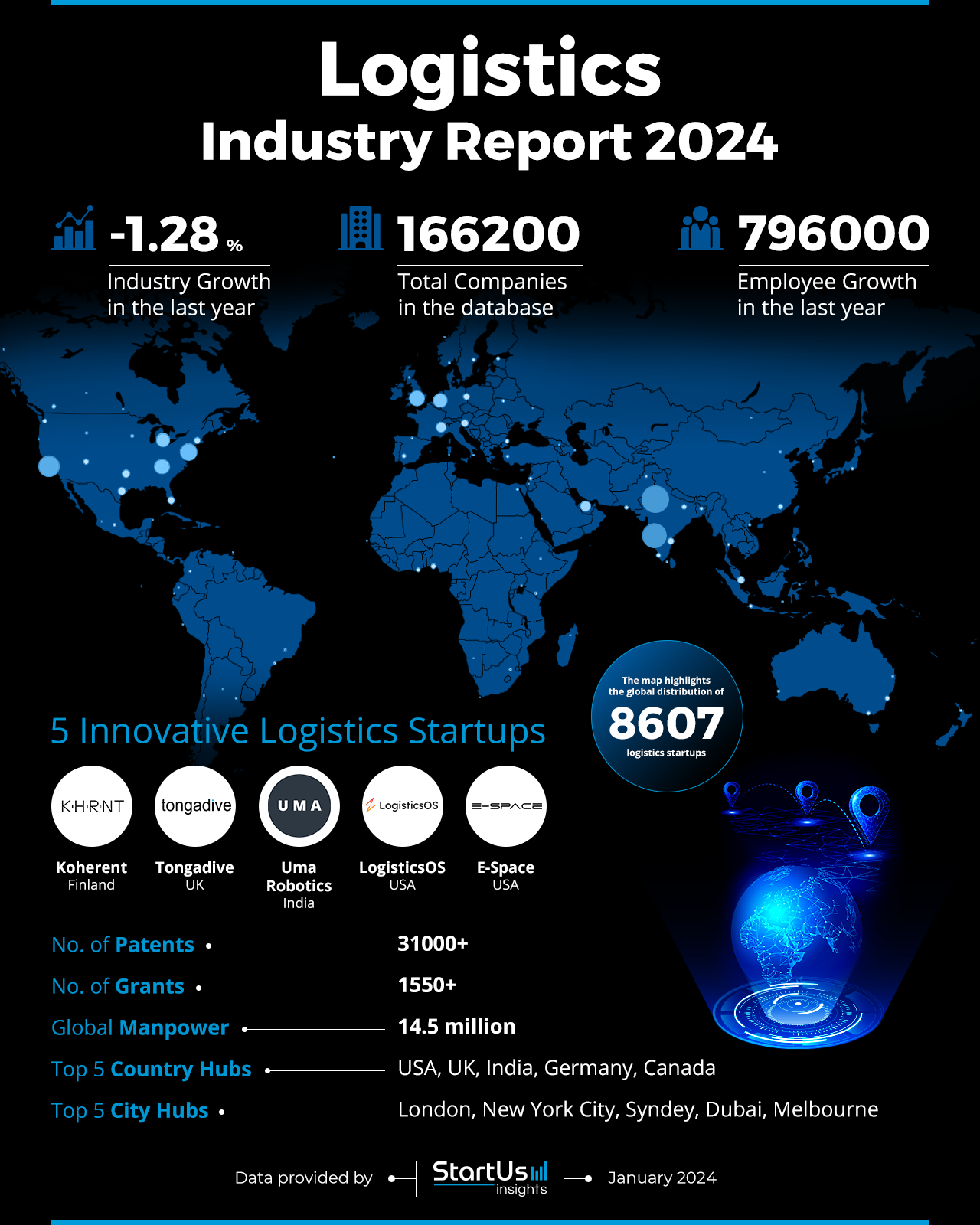The Logistics Report 2024 dives into the key industry data and explores innovation in the industry by examining the funding landscape and startup-driven innovations. As one of the most vital global industries, the activities of both established and emerging companies, as well as investors in the industry, provide a basis for the short-term direction of the industry.
This report was last updated in July 2024.
This report serves as a reference for stakeholders within the industry, investors, policymakers, and economic analysts, providing a snapshot of the industry’s health to map its trajectory for innovation and growth in the coming years.
StartUs Insights Logistics Report 2024
- Executive Summary
- Introduction to the Logistics Report 2024
- What data is used in this Logistics Report?
- Snapshot of the Global Logistics Industry
- Funding Landscape in the Logistics Industry
- Who is Investing in the Logistics Industry?
- 5 Logistics Startups impacting the Industry
Executive Summary: Logistics Industry Report 2024
This report is created using data obtained from the Big Data and AI-powered StartUs Insights Discovery Platform, covering more than 3.7 million global companies, as well as 20K+ technologies and emerging trends. We also analyzed a sample of 8600+ logistics startups developing innovative solutions to present five examples from emerging logistics industry trends.
- Industry Overview: The logistics sector, despite a marginal decline of -1.28% in growth, remains vast with 166 200+ companies, indicating its breadth and diversity.
- Workforce Expansion: Significant employee growth of 796 000 in the last year, increasing global manpower to 14.5 million, highlighting the sector’s importance in the global economy.
- Technological Innovation: Over 31 000 patents filed, demonstrating rapid advancements in efficiency, sustainability, and automation within logistics processes.
- Global Hubs: Top logistics hubs identified in the USA, UK, India, Germany, and Canada, showing emerging nodes in the global logistics network.
- Financial Investment: The sector experienced more than 32 000 funding rounds, reflecting a vibrant investment scene and strong financial interest.
- Investor Focus: Top investors have contributed over USD 16.5 billion, with major contributions from Tiger Global Management, Warburg Pincus, and Alibaba Group, among others.
- Startup Innovation: Five logistics startups are featured including Koherent (digital twin), Tongadive (supply chain software), Uma Robotics (autonomous navigation robots), LogisticsOS (route optimization engine), and E-Space (satellite-based tracking).
- Emerging Trends: Growing focus on virtualization and SaaS-based management in logistics, with examples in digital twin solutions, route optimization, and autonomous last-mile solutions.
- Recommendations for Stakeholders: Stay informed of industry developments and leverage emerging technologies to address growing uncertainties and meet business goals.
Explore the Data-driven Logistics Report for 2024
The Logistics Report 2024 uses data from the Discovery Platform and encapsulates the key metrics that underline the sector’s dynamic growth and innovation. Despite a marginal decline in industry growth of -1.28% over the last year, the industry’s scale remains impressive, with a total of 166 200+ companies cataloged in the database, illustrating the breadth and diversity of the logistics sector.
The data shows a considerable swell in the workforce, with an employee growth of 796 000 in the last year, pushing the global manpower to 14.5 million. This increase in employment underscores the industry’s vital importance to the global economy, particularly in a period where logistics and supply chain resilience have become key focal points and bottlenecks.
The map in the report visualizes the global distribution of logistics startups & shows the top logistics hubs in the USA, UK, India, Germany, and Canada, showing the emerging nodes in the global logistics network.
Innovation within the logistics sector is thriving, with over 31 000 patents filed, reflecting the rapid pace of technological advancement aimed at improving efficiency, sustainability, and automation in logistics processes. The industry’s innovation drive is also supported by the allocation of over 1550 grants, fueling research and development in this space.
What data is used to create this logistics report?
Based on the data provided by our Discovery Platform, we observe that the logistics industry ranks among the top 5% in the following categories relative to all 20K+ topics in our database. These categories provide a comprehensive overview of the industry’s key metrics and inform the short-term future direction of the industry.
- News Coverage & Publications: The industry has been the focus of extensive media attention, with over 175 000 publications in the last year.
- Funding Rounds: The industry closed more than 32 000 funding rounds, reflecting a vibrant investment scene and ongoing financial interest.
- Manpower: Employing more than 14.5 million workers, the industry is also showing growth by adding more than 796 000 new employees in the past year.
- Patents: The filing of over 31 000 patents further illustrates the industry’s commitment to innovation and continuous development.
- Grants: The awarding of more than 1550 grants is indicative of the sector’s research and development drive, supported by various institutions recognizing the importance of advancing logistics practices.
- and more!
A Snapshot of the Global Logistics Industry
The logistics industry stands as a cornerstone of global trade and supply chains, a fact that is underscored by the latest data underpinning its robust framework. Currently employing a massive workforce of 14.5 million individuals, the sector demonstrates not only its vast scale but also its significant role as a global employer.
The past year has seen substantial growth in this regard, with 796 000 new jobs created, highlighting the industry’s upward trajectory and its ability to adapt to increasing demands.
The logistics industry’s data informs about a thriving sector, characterized by significant employment opportunities, robust financial investment, and a strong commitment to innovation and efficiency in the movement of goods across the globe.
Explore the Funding Landscape of the Logistics Industry
Financially, the logistics sector remains a hotspot for investment, with an average investment value of USD 18.3 million. This figure represents the strong investor confidence in the industry’s capacity for innovation and its critical role in supporting the e-commerce market, among other sectors.
The involvement of more than 11 200 investors indicates a widespread recognition of the industry’s strategic importance and the diverse opportunities it presents. These investors range from venture capitalists seeking to back the next breakthrough in logistics technology to traditional industry players aiming to modernize their operations.
Further illustrating the sector’s dynamic nature are the more than 32 000 funding rounds that have closed, a testament to the continuous flow of capital that sustains and propels the industry forward. Such a high number of funding activities not only reflects the health of the logistics market but also signals the sector’s potential for future growth and its role in driving economic activity worldwide.
Who is Investing in the Logistics Industry?
The logistics industry captures substantial interest from a host of prominent investors, with the top contributors pouring in over USD 16.5 billion, showcasing the sector’s vitality and potential for innovation in global supply chain management.
- Tiger Global Management: Leads the pack with a formidable investment of USD 4.1 billion across 56 companies, underlining their strategic bet on logistics as a high-growth industry.
- Warburg Pincus: Has committed USD 2.9 billion to 24 companies, reflecting their confidence in the logistics sector’s capacity for transformative growth.
- Alibaba Group: With a deep understanding of e-commerce and logistics, Alibaba Group has invested USD 2.7 billion in 18 companies, aligning with its core business interests.
- SoftBank Vision Fund: Continues to make significant inroads with USD 2.4 billion invested across 22 companies, betting on disruptive logistics solutions.
- DST Global: Has channeled USD 1.6 billion into 11 companies, focusing on high-potential investments within the logistics landscape.
- Hillhouse Capital: Their investment strategy includes USD 1.5 billion allocated to 13 companies, targeting innovation in logistics and supply chain efficiencies.
- Sequoia Capital: A seasoned investor in growth industries, Sequoia Capital has infused USD 1.4 billion into 27 companies, fostering the development of next-generation logistics technologies.
These top investors are crucial to the logistics industry, enabling rapid technological advancements, fueling growth, and enhancing the efficiency of global supply chains. Their investments reflect a collective belief in technology-driven innovation to drive the globalized logistics economy.
5 Top Examples from 8600+ Innovative Logistics Startups
The five innovative startups showcased below are picked based on data including the trend they operate within and their relevance, founding year, funding status, and more. Book a demo to find promising startups, emerging trends, or industry data specific to your company’s needs and objectives.
Koherent specializes in Digital Twin & Modeling
GridTM is a positioning system developed by Koherent that offers accurate 3D and 6D location data to enable automated operations and monitoring in a variety of environments. It provides millimeter-level precision as an affordable alternative to GPS and optical systems.
GridTM finds applications in machine control, construction, mining, port automation, and structural health monitoring. It also allows for continuous indoor logistics and manufacturing in dynamic environments. Further, GridTM‘s high-accuracy positioning enables extended realities that transition between indoor and outdoor locations without constraints.
Tongadive develops Smart & Secure Supply Chain Software
Evidnt by Tongadive, a UK-based startup, is an end-to-end supply chain visibility software that combines GS1 serialization, blockchain distributed ledger technology, and neural networks. It creates a secure and immutable digital twin of the product package and is deployed as a cloud-based SaaS or on-premise integrated system.
Tingadive’s software further adds value through regulatory compliance, cost efficiency, waste reduction, circularity, and sustainable sourcing. Moreover, Evidnt uses an innovative algorithm to generate and track serialized data on a blockchain platform that connects to predictive demand forecasting from neural networks.
Uma Robotics builds Autonomous Navigation Robots
Indian startup Uma Robotics specializes in AI-enabled material handling and robotic navigation systems for warehouses. Its robots handle indoor and outdoor logistics automation, including racking systems, autonomous inspection, warehouse transportation, and conveyor robots. These robots transport heavy totes and boxes of varying sizes and navigate cluttered environments. The startup’s solutions replace manual tasks, ensuring 24×7 execution, and reducing operational expenses.
LogisticsOS develops a Route Optimization Engine
US-based startup LogisticsOS provides an algorithm REST API for companies in the last mile delivery space to dispatch drivers and optimize delivery sequences. Its customers range from traditional logistics companies with fleet management platforms to on-demand delivery companies with mobile apps and drivers. The startup’s route optimization engine helps delivery companies manage route density, volume, and computational capabilities to achieve greater efficiencies.
E-Space advances Freight Tracking
US-based startup E-Space develops asset-tracking technology to enable new insights into global assets and reshape logistics. E-Space’s technology enables tracking, controlling, connecting, and management of containers, airfreight, vehicles, or objects. Using satellite technologies, E-space offers significant improvements to resolution, reliability, and affordability compared to prior technologies.
It achieves this through the E-Space constellation, an LEO space system design that improves the coverage, performance, throughput, and total system cost of LEO satellite systems. It is currently working with large shipping and logistics companies to embed these capabilities.
Gain Comprehensive Insights into Logistics Trends, Startups, or Technologies
The logistics industry report reflects an industry that is expansive, dynamic, and pivotal to the function of international trade and commerce, despite facing short-term growth challenges. Growing uncertainties within the industry require stakeholders to stay on top of the developments impacting the industry’s health. Get in touch to explore all 8600+ startups and scaleups, as well as all industry data and trends impacting logistics companies.











